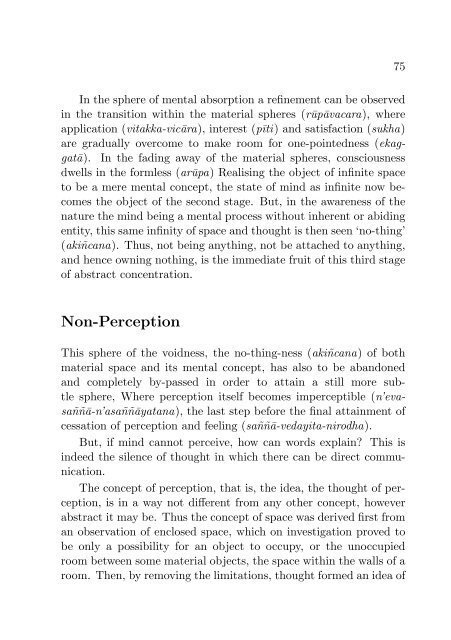Agony and Ecstasy
A comparative study of the five hindrances, together with the five states of concentration or mental absorption.
A comparative study of the five hindrances, together with the five states of concentration or mental absorption.
Create successful ePaper yourself
Turn your PDF publications into a flip-book with our unique Google optimized e-Paper software.
75<br />
In the sphere of mental absorption a refinement can be observed<br />
in the transition within the material spheres (rūpāvacara), where<br />
application (vitakka-vicāra), interest (pīti) <strong>and</strong> satisfaction (sukha)<br />
are gradually overcome to make room for one-pointedness (ekaggatā).<br />
In the fading away of the material spheres, consciousness<br />
dwells in the formless (arūpa) Realising the object of infinite space<br />
to be a mere mental concept, the state of mind as infinite now becomes<br />
the object of the second stage. But, in the awareness of the<br />
nature the mind being a mental process without inherent or abiding<br />
entity, this same infinity of space <strong>and</strong> thought is then seen ‘no-thing’<br />
(akiñcana). Thus, not being anything, not be attached to anything,<br />
<strong>and</strong> hence owning nothing, is the immediate fruit of this third stage<br />
of abstract concentration.<br />
Non-Perception<br />
This sphere of the voidness, the no-thing-ness (akiñcana) of both<br />
material space <strong>and</strong> its mental concept, has also to be ab<strong>and</strong>oned<br />
<strong>and</strong> completely by-passed in order to attain a still more subtle<br />
sphere, Where perception itself becomes imperceptible (n’evasaññā-n’asaññāyatana),<br />
the last step before the final attainment of<br />
cessation of perception <strong>and</strong> feeling (saññā-vedayita-nirodha).<br />
But, if mind cannot perceive, how can words explain? This is<br />
indeed the silence of thought in which there can be direct communication.<br />
The concept of perception, that is, the idea, the thought of perception,<br />
is in a way not different from any other concept, however<br />
abstract it may be. Thus the concept of space was derived first from<br />
an observation of enclosed space, which on investigation proved to<br />
be only a possibility for an object to occupy, or the unoccupied<br />
room between some material objects, the space within the walls of a<br />
room. Then, by removing the limitations, thought formed an idea of

















